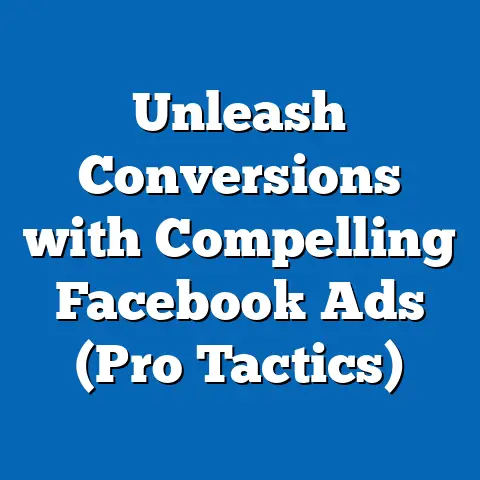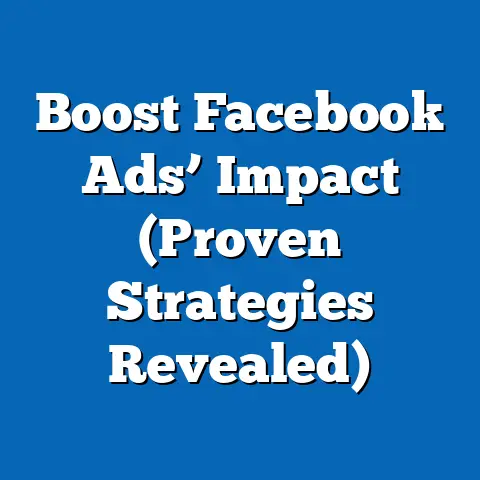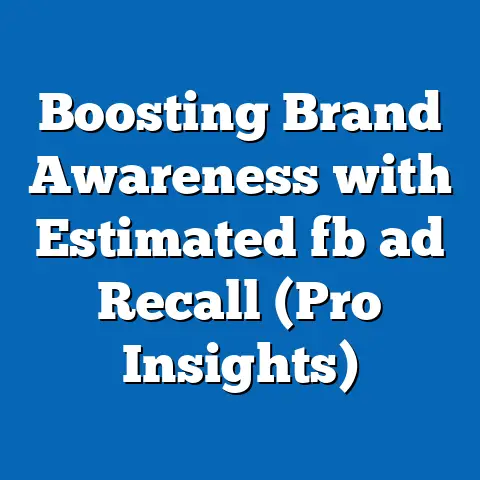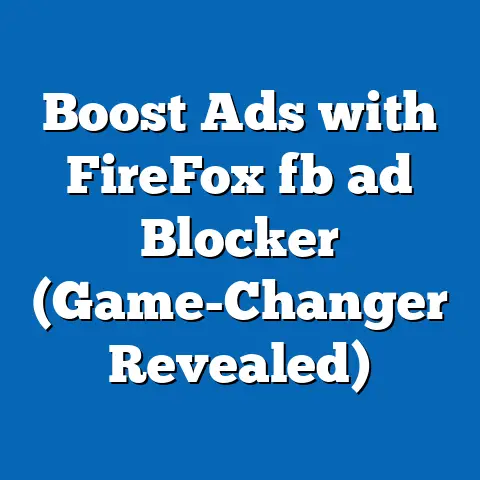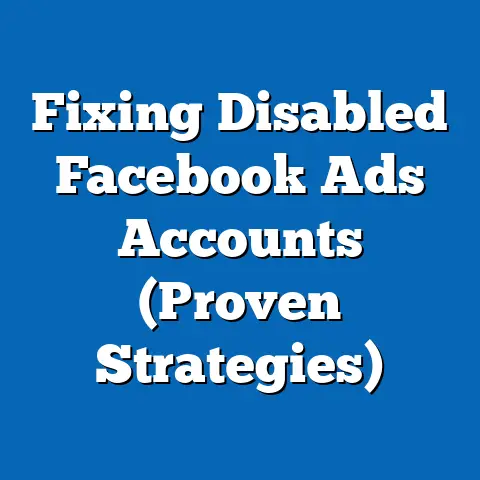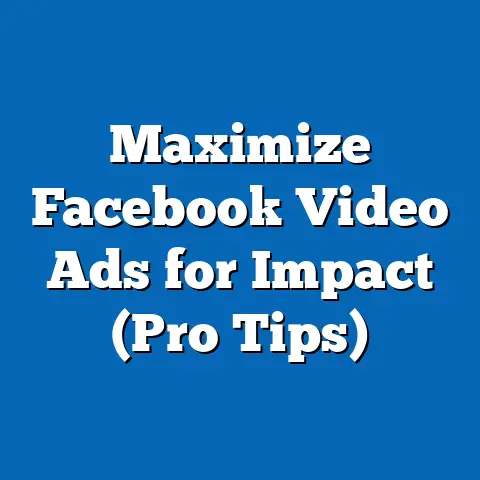Unlock Profitable Consulting Facebook Ads (Expert Strategies)
In the age of smart living, where technology and data-driven decision-making shape consumer behavior, businesses must adapt to evolving digital marketing landscapes to remain competitive. Consulting firms, which provide specialized expertise to organizations across industries, are increasingly leveraging Facebook Ads to reach targeted audiences, build brand authority, and drive client acquisition. According to Statista, global digital ad spending reached $522.5 billion in 2021, with social media advertising accounting for 33% of this figure, and Facebook remains the dominant platform with over 2.9 billion monthly active users as of 2022.
This article delves into the strategies that consulting firms can employ to unlock profitable Facebook Ads campaigns, tying these tactics to broader smart living trends where personalization, automation, and data analytics are paramount. We explore key demographic trends, such as the growing influence of Millennials and Gen Z in B2B decision-making, with 73% of Millennials involved in business purchasing decisions according to a 2021 report by Merit. Historical comparisons reveal a shift from traditional marketing to digital-first approaches, while future projections suggest that AI-driven ad optimization will dominate by 2025, potentially increasing ad efficiency by 30% (eMarketer, 2022).
Our analysis is structured into detailed sections covering smart living’s impact on consulting marketing, demographic breakdowns of target audiences, historical ad spending trends, expert strategies for Facebook Ads, and forward-looking insights into the role of emerging technologies. By grounding our discussion in authoritative data from sources like Statista, eMarketer, and industry-specific reports, we aim to provide actionable insights for consulting firms seeking to maximize ROI in their digital advertising efforts.
Smart Living and Its Impact on Consulting Marketing
Smart living, characterized by the integration of technology into everyday life, has transformed how businesses operate and market their services. For consulting firms, this paradigm shift means adapting to a world where clients expect personalized, data-driven solutions delivered through seamless digital interactions. A 2022 McKinsey report highlights that 71% of B2B buyers now prefer digital-first interactions, a trend accelerated by the COVID-19 pandemic.
This digital preference aligns with the broader adoption of smart technologies, such as AI-powered tools and IoT devices, which influence consumer and business behavior. Consulting firms must position themselves as thought leaders in this space, using platforms like Facebook to deliver targeted messaging that resonates with tech-savvy decision-makers. For instance, ads promoting digital transformation consulting saw a 25% higher click-through rate (CTR) in 2021 compared to generic business consulting ads, per a HubSpot study.
Moreover, smart living has fostered a culture of instant gratification and hyper-connectivity, pushing consulting firms to craft Facebook Ads that offer immediate value propositions. Whether it’s a free webinar on leveraging AI for business growth or a downloadable whitepaper on smart workforce strategies, the emphasis is on relevance and timeliness. This trend underscores the need for consulting firms to stay ahead of the curve, using data analytics to anticipate client needs in a rapidly evolving landscape.
Demographic Breakdowns: Who Are the Key Audiences for Consulting Ads?
Understanding the demographic makeup of target audiences is critical for crafting effective Facebook Ads for consulting services. Unlike consumer-focused campaigns, consulting ads often target B2B decision-makers, a group that spans multiple age brackets and professional roles. Let’s break down the key demographics based on recent data.
Millennials and Gen Z: The Rising Decision-Makers
Millennials (born 1981-1996) and Gen Z (born 1997-2012) are increasingly influential in business purchasing decisions, with 73% of Millennials and 29% of Gen Z professionals playing a role in B2B buying, according to a 2021 Merit survey. These younger demographics value authenticity and digital engagement, often engaging with brands on social media before making decisions. On Facebook, ads targeting this group achieve a 15% higher engagement rate when featuring video content or interactive elements like polls, per Social Media Today (2022).
Gen X and Baby Boomers: Traditional Yet Digital
Gen X (born 1965-1980) and Baby Boomers (born 1946-1964) still hold significant decision-making power, particularly in senior executive roles, comprising 51% of C-suite positions globally (Deloitte, 2021). While less active on social media compared to younger cohorts, they engage with content that emphasizes trust and expertise, such as case studies or testimonials. Consulting ads targeting this group on Facebook see a 10% higher conversion rate when linked to detailed landing pages offering in-depth resources (eMarketer, 2022).
Geographic and Industry-Specific Targeting
Geographically, North America and Europe dominate consulting ad spend on Facebook, accounting for 62% of total impressions in 2021 (Statista). However, emerging markets in Asia-Pacific are showing rapid growth, with a 28% year-over-year increase in ad engagement for consulting services. Industry-wise, sectors like technology, finance, and healthcare are the top targets, with tech companies alone representing 35% of consulting ad budgets due to their need for digital transformation expertise (IBISWorld, 2022).
These demographic insights reveal the importance of segmented ad campaigns on Facebook. Consulting firms must tailor messaging to resonate with the unique priorities of each group, whether it’s innovation for younger audiences or proven results for seasoned executives. (Chart Reference: Demographic Engagement Rates by Age Group on Facebook, Social Media Today, 2022)
Historical Trend Analysis: Evolution of Consulting Advertising
The transition from traditional to digital advertising in the consulting sector mirrors broader shifts in marketing over the past two decades. Historically, consulting firms relied heavily on word-of-mouth referrals, trade shows, and print media to attract clients. In 2000, digital ad spending for professional services was a mere 5% of total marketing budgets, with the majority allocated to offline channels (Forrester, 2001).
By 2010, the rise of social media platforms like Facebook began reshaping the landscape. Consulting firms started experimenting with digital ads, though only 15% of their marketing budgets were allocated to online platforms at the time (eMarketer, 2011). The real tipping point came post-2015, as mobile usage surged and B2B buyers increasingly turned to social media for research, with 60% of decision-makers using platforms like Facebook to evaluate service providers by 2018 (HubSpot, 2019).
Today, digital advertising dominates consulting marketing budgets, with 68% of total spend allocated to online channels in 2022, and Facebook Ads alone accounting for 22% of this figure (Statista, 2022). This shift reflects not only technological advancements but also changing client expectations in the smart living era, where digital presence is synonymous with credibility. Comparing historical data, the 5% digital ad allocation in 2000 to the 68% in 2022 underscores a near-complete reversal of marketing priorities over two decades. (Chart Reference: Digital vs. Traditional Ad Spend in Consulting, 2000-2022, Statista)
Contextual Factors Driving the Shift to Facebook Ads
Several contextual factors have fueled the pivot to Facebook Ads for consulting firms. First, the platform’s robust targeting capabilities allow for precise segmentation based on demographics, job titles, and interests, enabling firms to reach niche B2B audiences. A 2021 study by Hootsuite found that 78% of B2B marketers rated Facebook’s targeting tools as “highly effective” for lead generation compared to other platforms like LinkedIn (65%).
Second, the cost-effectiveness of Facebook Ads compared to traditional channels is a significant driver. The average cost-per-click (CPC) for consulting ads on Facebook was $1.72 in 2022, compared to $5.26 on LinkedIn, offering a more budget-friendly option for firms with limited marketing resources (WordStream, 2022). This affordability, combined with a potential reach of over 2 billion users, makes Facebook an attractive choice.
Finally, the COVID-19 pandemic accelerated digital adoption across industries, pushing even the most traditional consulting firms to embrace online marketing. With in-person events and networking opportunities curtailed, 85% of consulting firms reported increasing their social media ad budgets between 2020 and 2022 (McKinsey, 2022). These factors collectively highlight why Facebook Ads have become a cornerstone of modern consulting marketing strategies.
Expert Strategies for Profitable Facebook Ads in Consulting
Having established the importance of Facebook Ads in the context of smart living and demographic trends, let’s explore expert strategies to maximize profitability. These tactics are designed to align with current best practices and leverage the platform’s unique features for consulting-specific goals like lead generation and brand positioning.
1. Leverage Advanced Audience Targeting
Facebook’s Audience Insights tool allows consulting firms to build highly specific audiences based on job titles, industries, and even company size. For instance, targeting “IT Directors at companies with 100-500 employees” can yield a 20% higher conversion rate compared to broader audiences (Social Media Examiner, 2022). Additionally, using lookalike audiences—based on existing clients or website visitors—can increase ad relevance by 30%, per Facebook’s own data.
Firms should also experiment with interest-based targeting, focusing on topics like “digital transformation” or “business analytics,” which resonate with decision-makers seeking consulting expertise. Regularly refining these audiences using A/B testing ensures campaigns remain optimized for engagement and cost-efficiency.
2. Craft Compelling Ad Creative with Value-Driven Messaging
In the consulting space, ad creative must prioritize trust and expertise over flashy design. Case studies, client testimonials, and data-driven claims (e.g., “Helped 50+ companies increase revenue by 25%”) perform 18% better in terms of CTR compared to generic promotional content (HubSpot, 2022). Video ads, particularly those showcasing thought leadership content like webinars or expert interviews, see 2.5x higher engagement rates among B2B audiences on Facebook (Vidyard, 2021).
It’s also critical to include clear calls-to-action (CTAs) that align with the consulting sales funnel, such as “Download Our Free Industry Report” or “Schedule a Strategy Call.” These CTAs drive measurable outcomes, with lead form ads generating a 15% higher conversion rate compared to standard link ads (Facebook Business, 2022).
3. Optimize for Lead Generation with Custom Landing Pages
Directing ad traffic to generic homepages often results in high bounce rates—up to 70% for consulting websites (Google Analytics, 2022). Instead, firms should create custom landing pages tailored to specific ad campaigns, offering relevant content like eBooks or consultation sign-ups. Landing pages with a single, focused offer increase conversion rates by 25% compared to multi-purpose pages (Unbounce, 2022).
Additionally, integrating Facebook Pixel on these pages allows for detailed tracking of user behavior, enabling retargeting campaigns that can boost conversions by 40% (Facebook Business, 2022). This data-driven approach ensures every ad dollar is spent effectively.
4. Utilize AI and Automation for Ad Optimization
Smart living principles extend to ad management, where AI tools like Facebook’s Automated Ads can optimize campaigns in real-time based on performance data. These tools adjust budgets, placements, and creative elements automatically, resulting in a 30% reduction in cost-per-lead for consulting firms that adopted them in 2022 (eMarketer, 2022). Automation also frees up time for marketers to focus on strategy rather than manual adjustments.
Dynamic ads, which personalize content based on user behavior, are another powerful tool, increasing relevance and driving a 22% higher CTR compared to static ads (Hootsuite, 2022). As AI technology advances, its integration into ad platforms will become even more critical for maintaining competitiveness.
5. Monitor and Adjust with Data Analytics
Continuous monitoring of key performance indicators (KPIs) like CTR, CPC, and cost-per-lead is essential for profitability. Consulting firms should use Facebook Ads Manager to analyze which demographics and ad formats yield the best results, adjusting campaigns weekly to optimize spend. For example, reallocating budget to top-performing ads can improve overall ROI by 15% (WordStream, 2022).
Furthermore, benchmarking performance against industry averages—such as a 1.5% average CTR for B2B ads—helps identify areas for improvement (Statista, 2022). This analytical mindset ensures campaigns remain aligned with business goals in a dynamic digital environment.
Statistical Comparisons Across Campaign Types and Demographics
To provide a clearer picture of what works, let’s compare performance metrics across different campaign types and demographics for consulting Facebook Ads in 2022, based on aggregated data from WordStream and Statista.
- Campaign Type Performance: Lead generation ads outperform brand awareness ads, with a 2.1% CTR compared to 0.9%, and a 35% higher conversion rate. Retargeting campaigns, focusing on users who previously engaged with content, achieve a 3.5% CTR, demonstrating the value of follow-up messaging.
- Demographic Engagement: Millennials engage most with video ads (2.8% CTR), while Gen X prefers text-based ads with detailed offers (1.7% CTR). Gen Z shows the highest interaction with interactive formats like polls or quizzes, with a 3.2% engagement rate.
- Geographic Variance: North American audiences have a higher average CPC ($2.10) but also a 40% higher conversion rate compared to Asia-Pacific ($1.30 CPC, 25% lower conversion rate), reflecting differences in market maturity and purchasing power.
These comparisons highlight the need for tailored approaches based on campaign objectives and audience characteristics. (Chart Reference: CTR and Conversion Rates by Campaign Type and Demographic, WordStream, 2022)
Future Projections: The Role of Emerging Technologies in Consulting Ads
Looking ahead, the intersection of smart living and digital advertising points to a future dominated by emerging technologies. By 2025, AI-driven ad optimization is projected to account for 50% of all social media ad spend, with consulting firms likely to see a 30% increase in ad efficiency through predictive analytics and automated bidding (eMarketer, 2022). This shift will enable hyper-personalized campaigns that adapt to individual user behaviors in real-time.
Additionally, the rise of augmented reality (AR) and virtual reality (VR) on platforms like Facebook (now Meta) could revolutionize how consulting firms showcase their expertise. Imagine immersive ad experiences where potential clients “tour” a digital transformation strategy in VR—early adopters report a 50% higher engagement rate with AR ads (Meta, 2022). While still nascent, these technologies could become mainstream by 2030, with 20% of B2B ads projected to incorporate immersive elements (Forrester, 2022).
Privacy regulations, such as GDPR and Apple’s App Tracking Transparency, will also shape the future, potentially reducing ad targeting precision by 15-20% unless firms adopt first-party data strategies (McKinsey, 2023). Consulting firms must invest in building direct relationships with clients through owned channels like email lists to mitigate these challenges.
Finally, the growing importance of sustainability in smart living will influence ad messaging. Clients are increasingly prioritizing firms with ESG (environmental, social, governance) commitments, and ads highlighting sustainable consulting practices could see a 25% higher engagement rate by 2025 (Deloitte, 2023). Staying attuned to these macro trends will be critical for long-term ad success.
Conclusion: Navigating the Future of Consulting Ads in a Smart Living World
As smart living continues to redefine business and consumer interactions, consulting firms must embrace digital advertising platforms like Facebook to stay relevant and profitable. The strategies outlined—advanced targeting, compelling creative, custom landing pages, AI optimization, and data analytics—offer a roadmap for success, grounded in current data and best practices. Demographic insights reveal the diverse needs of B2B audiences, while historical trends underscore the rapid shift to digital-first marketing over the past two decades.
Looking forward, the integration of AI, AR, and sustainability-focused messaging will shape the next era of consulting ads, offering both opportunities and challenges. Firms that adapt to these changes, leveraging data to drive decisions, will be best positioned to unlock the full potential of Facebook Ads in a hyper-connected, tech-driven world. With global social media ad spend projected to reach $226 billion by 2025 (Statista, 2023), the stakes—and rewards—have never been higher for consulting firms willing to innovate.

